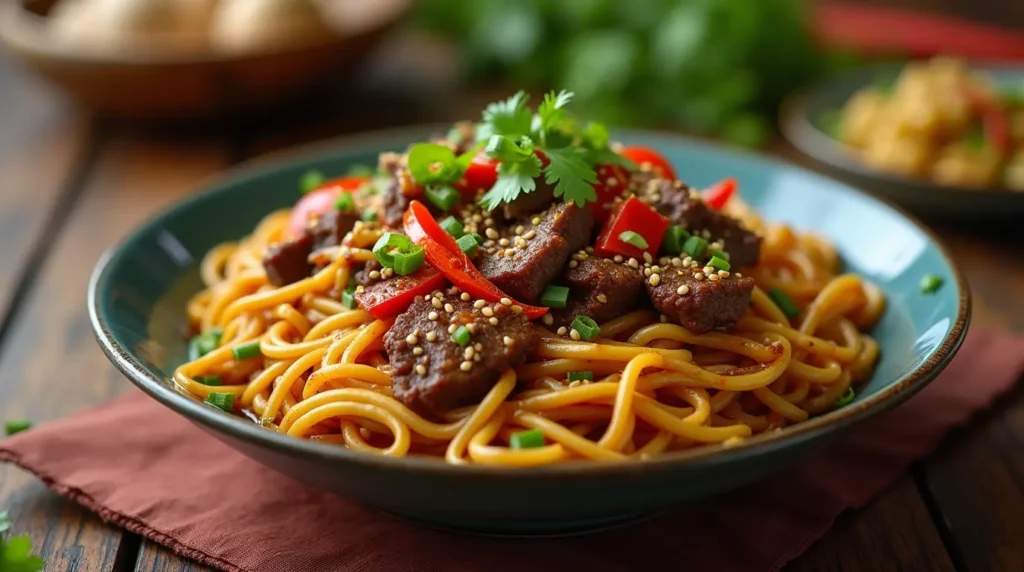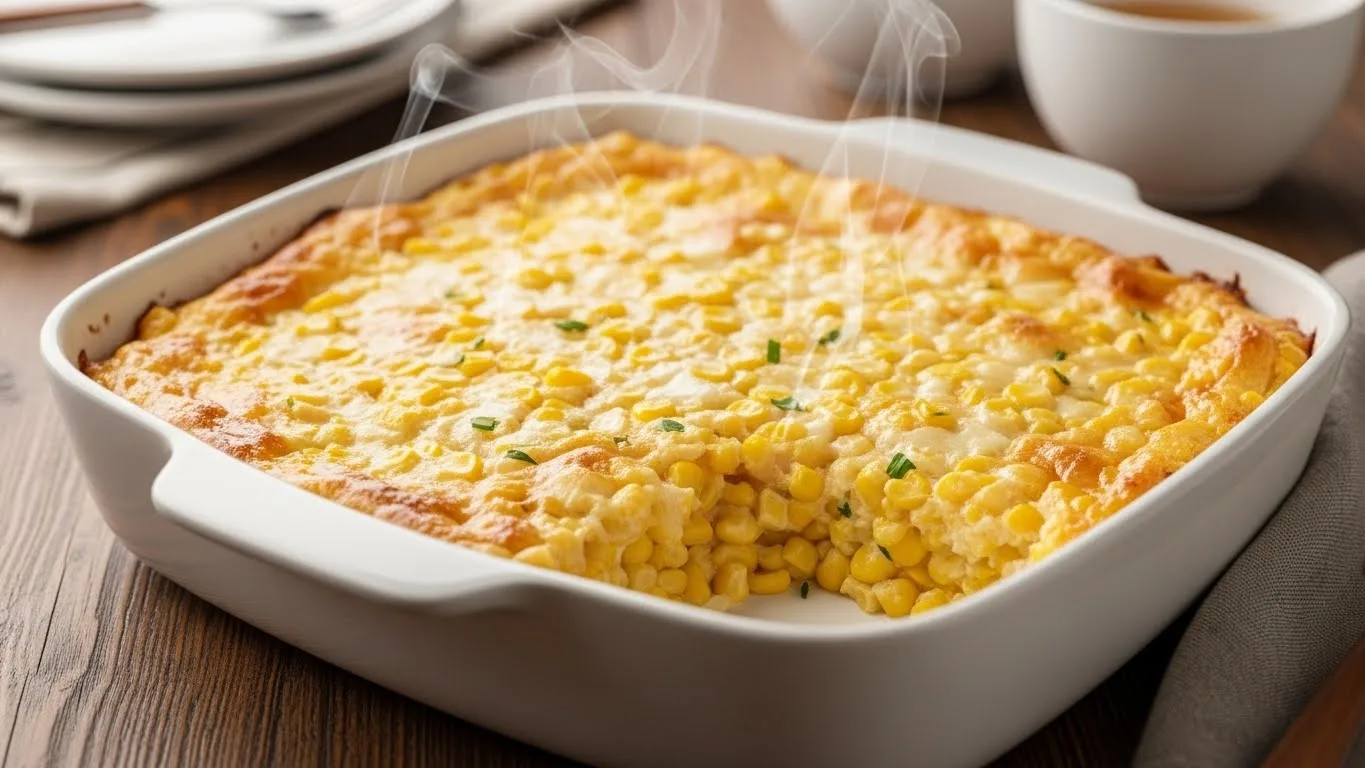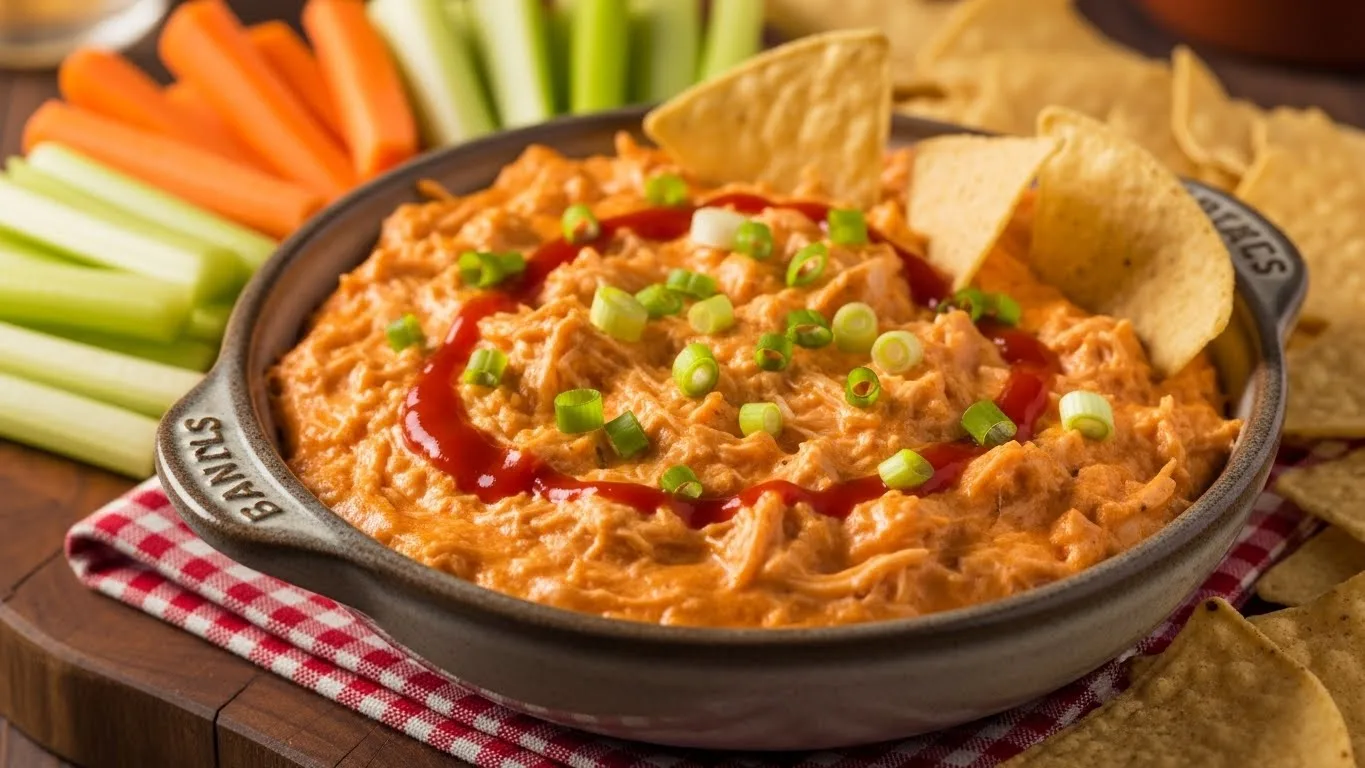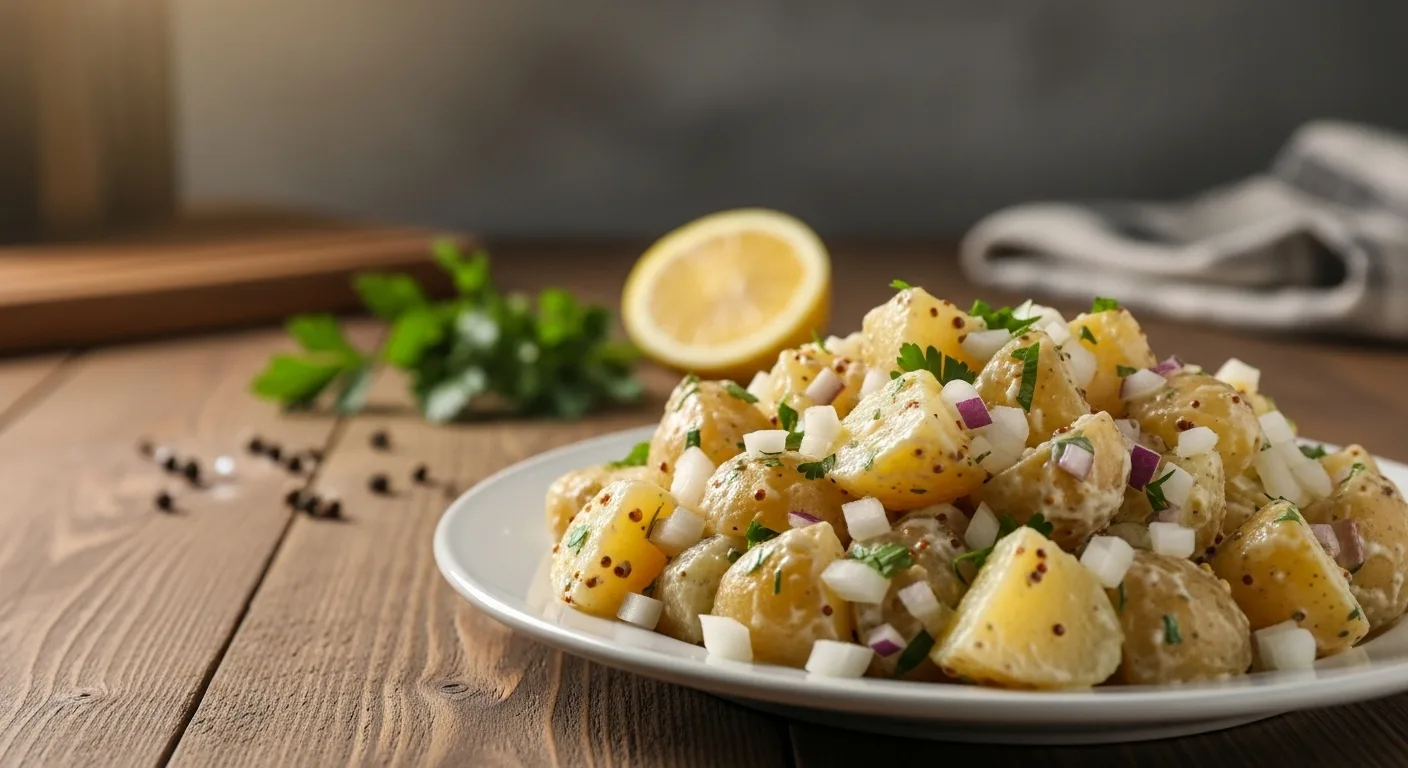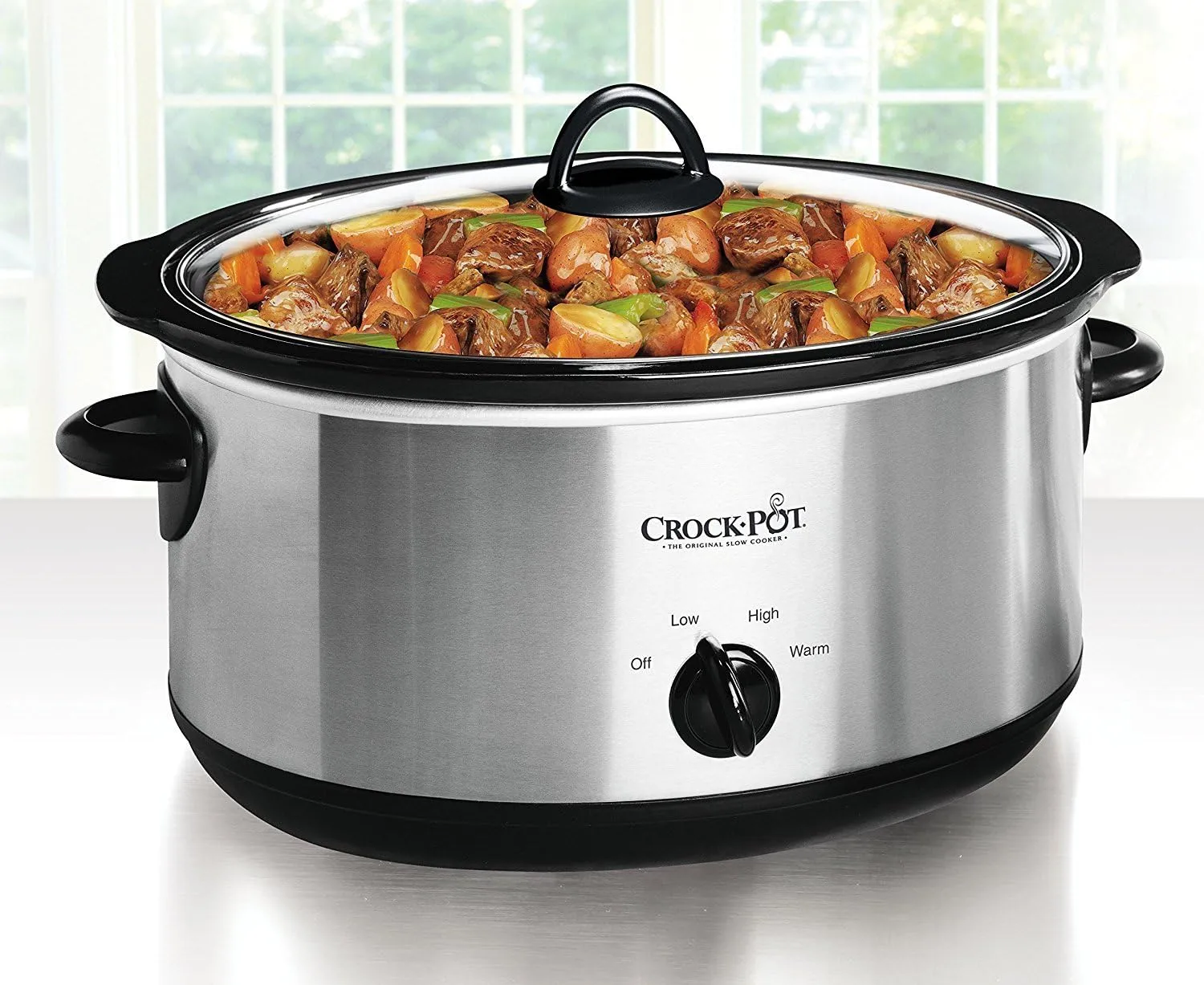Ever wondered how to make Mongolian beef noodles like a restaurant in just 30 minutes? It’s possible to turn a simple weeknight dinner into a delicious Asian-inspired meal quickly.
Mongolian beef noodles are a culinary magic trick. They combine tender flank steak, silky noodles, and a savory sauce. This recipe is great for busy home cooks who want authentic takeout flavors fast.
With just 30 minutes, you can enjoy these Mongolian beef noodles. The secret is using fresh ingredients and mastering simple cooking techniques. These steps turn basic components into an amazing dish.
Table of Contents
ToggleKey Takeaways
- Prepare Mongolian beef noodles in just 30 minutes
- Perfect for quick weeknight dinners
- Restaurant-quality flavor at home
- Customizable with various protein and vegetable options
- Balanced nutrition with 22g protein per serving
Understanding Mongolian Beef Noodles: A Quick History
Mongolian beef noodles have a surprising history. They don’t really come from Mongolian cuisine. Instead, they started in Taiwan and are now a favorite in American Chinese restaurants.
The story of mongolian beef noodles is quite interesting. Taiwanese Mongolian barbecue restaurants helped make it popular. Now, it’s a favorite takeout dish in the United States.
Cultural Origins and Misconceptions
Many think Mongolian beef comes from Mongolia. But, it actually comes from Chinese cooking. It combines new flavors with old techniques. The dish includes:
- Flank steak sliced thin
- Rich brown sauce with hoisin and soy components
- Fresh vegetables like broccoli
- Served over steamed rice or crispy noodles
Evolution in Modern Cuisine
As Chinese-American food evolved, mongolian beef noodles became a hit. It’s quick, tasty, and packed with protein. This made it a staple in many restaurants.
“Mongolian beef represents more than just a meal – it’s a culinary bridge between traditional and modern cooking styles.”
Why It’s a Popular Take-Out Choice
Mongolian beef noodles are loved for their bold flavors and protein. With about 38g of protein per serving, it’s filling and delicious. It’s perfect for a quick lunch or a hearty dinner.
Essential Ingredients for Perfect Mongolian Beef Noodles
Starting to make authentic mongolian ground beef noodles means picking the right ingredients. Your journey in the kitchen begins with knowing each part’s role in making a tasty meal.
The main ingredients for your mongolian ground beef noodles are:
- 1 pound lean ground beef (90% recommended)
- 10 ounces noodles (linguine or spaghetti)
- 4 teaspoons fresh minced ginger
- 6 cloves minced garlic
- ½ cup beef broth
- ½ cup low-sodium soy sauce
- 4 tablespoons hoisin sauce
Your sauce ingredients are key to rich, complex flavors. Brown sugar adds sweetness, and red pepper flakes bring a gentle heat that makes the dish better.
“The secret to great mongolian ground beef noodles lies in balancing your ingredients precisely.”
Other important ingredients include:
- 1 tablespoon cornstarch (for thickening)
- 2 tablespoons water
- 4 green onions, sliced
- Sesame oil for finishing
By choosing and mixing these ingredients carefully, you’ll make a dish as good as a restaurant’s mongolian ground beef noodles in your own kitchen.
Selecting the Right Cut of Beef
Creating tasty beef Mongolian noodles begins with picking the right beef cut. The meat you choose can turn a simple meal into a memorable one. It’s all about the quality of your ingredients.
Flank Steak: The Premier Choice for Mongolian Beef
Flank steak is the best choice for beef Mongolian noodles. It has several benefits:
- Exceptional flavor profile
- Naturally lean meat texture
- Quick cooking time
- Affordable pricing
Cutting Techniques for Tender Beef
Slicing your beef right is key for tender Mongolian noodles. Always cut against the grain. This method makes the meat soft and chewable.
“Cutting against the grain is the secret to restaurant-quality beef Mongolian noodles.” – Professional Chef
Tenderizing Methods
To make your beef even tenderer, try these methods:
- Marinate with baking soda solution for 10 minutes
- Use a meat mallet to break down tough fibers
- Slice meat extremely thin (about ¼ inch)
With the right selection and preparation, your beef Mongolian noodles will be as good as any restaurant’s.
The Secret Behind the Signature Sauce
Making the perfect sauce is key to great mongolian beef noodles. It’s all about mixing sweet, savory, and umami flavors. This mix turns a simple dish into a work of art.
Your signature sauce has special ingredients. They work together to create a taste that’s hard to resist:
- Low-sodium soy sauce for depth
- Brown sugar for a hint of sweetness
- Asian sweet chili sauce for extra flavor
- Minced garlic and grated ginger for a strong aroma
The secret to your sauce? Cornstarch. It thickens the sauce and makes it shiny. This gives your dish a restaurant-quality look and feel.
“A great sauce transforms a good dish into an extraordinary experience” – Professional Chef
When making your sauce, aim for the right mix. You’ll need about:
- ½ cup low-sodium soy sauce
- ¼ cup brown sugar
- 2 tablespoons cornstarch
- 1 tablespoon rice wine
- ½ teaspoon red pepper flakes (optional)
Pro tip: For the best mongolian beef noodles, mix your sauce well. Let it sit for 10-15 minutes. This lets the flavors blend perfectly.
Choosing the Best Noodles for Your Dish
Choosing the right noodles can make your Mongolian beef and noodles dish amazing. The perfect noodle adds texture, flavor, and authenticity to your dish.
Exploring Asian Noodle Varieties
When making Mongolian beef and noodles, you have many tasty options:
- Ramen Noodles: Quick-cooking and springy, perfect for fast meals
- Lo Mein Noodles: Thick, wheat-based noodles that soak up sauce well
- Udon Noodles: Thick, chewy Japanese noodles for a hearty texture
- Rice Noodles: Gluten-free option that cooks in just 3-4 minutes
- Soba Noodles: Nutty buckwheat noodles with a unique taste
Mastering Noodle Preparation
Cooking noodles for Mongolian beef needs precision. Here are some tips for perfect texture:
- Always salt your water generously
- Cook noodles until al dente – usually 3-4 minutes
- Rinse with cold water to stop cooking
- Drain well to avoid a soggy dish
“The secret to great Mongolian beef and noodles lies in selecting the right noodle and cooking it perfectly.” – Chef’s Wisdom
Your noodle choice greatly affects your Mongolian beef dish’s enjoyment. Try different types to find your favorite!
Step-by-Step Cooking Process
Making delicious mongolian beef noodles with high protein jlalsamfit needs care and skill. Your 30-minute cooking journey starts with preparation and smart cooking steps.
- Prepare and Tenderize Beef
- Cut 1½ pounds flank steak into thin strips
- Coat beef with ¼ cup cornstarch for enhanced texture
- Create Signature Sauce
- Combine low sodium soy sauce, brown sugar, chicken broth
- Add minced garlic and red pepper flakes
- Cooking Sequence
- Heat ¼ cup vegetable oil in wok
- Brown beef strips quickly (2-3 minutes)
- Remove beef, keep warm
- Noodle Preparation
- Cook 8 ounces ramen noodles
- Drain and set aside
Your high protein mongolian beef noodles will give you 33g of protein per serving. The jlalsamfit cooking method keeps flavor and nutrition high.
| Ingredient | Quantity | Purpose |
|---|---|---|
| Flank Steak | 1½ pounds | Primary protein source |
| Ramen Noodles | 8 ounces | Carbohydrate base |
| Vegetable Oil | ¼ cup | Cooking medium |
“Cooking is an art, and Mongolian beef noodles are your canvas!” – Professional Chef
Final step: Mix beef, noodles, and sauce. Top with chopped green onions and serve right away for the best taste.
Vegetable Additions and Combinations
Adding the right vegetables can make your mongolian ground beef noodles better. The right mix of veggies can turn a basic dish into a healthy and colorful meal.
Essential Vegetables for Flavor and Nutrition
Some veggies are key for taste and health in mongolian ground beef noodles. Your main veggies should be:
- Bell peppers (red and green)
- Onions
- Broccoli florets
- Carrots
Optional Vegetable Add-ins for Creativity
Try new veggies to make your mongolian ground beef noodles even better:
- Mushrooms
- Snow peas
- Baby bok choy
- Cabbage
| Vegetable | Cooking Time | Nutritional Benefit |
|---|---|---|
| Broccoli | 8-10 minutes | High in Vitamin C |
| Bell Peppers | 5-7 minutes | Rich in Antioxidants |
| Carrots | 6-8 minutes | Excellent Vitamin A Source |
Try to add 5 cups of mixed vegetables to your mongolian ground beef noodles. Thinly slice them for even cooking and the best flavor.
“The secret to great mongolian ground beef noodles is balancing meat, noodles, and vegetables.” – Chef’s Recommendation
Time-Saving Tips and Tricks
Making delicious Mongolian beef noodles doesn’t have to take a lot of time. With smart strategies, you can make a tasty meal quickly.
Here are some expert tips to make your Mongolian beef noodles prep smooth and fast:
- Prep ingredients in advance: Slice beef and chop vegetables the night before
- Use pre-cut vegetables to reduce chopping time
- Invest in a high-quality wok for faster, more even cooking
- Measure sauce ingredients beforehand and store in a single container
“Efficiency in the kitchen is about smart preparation, not cutting corners on flavor.” – Culinary Experts
Here are more tips to make your cooking workflow better:
- Keep your pantry stocked with essential ingredients
- Use pre-minced garlic and ginger to save chopping time
- Cook noodles while preparing the beef to maximize efficiency
| Technique | Time Saved |
|---|---|
| Meal Prepping | 15-20 minutes per cooking session |
| Pre-cutting Ingredients | 10-15 minutes during cooking |
| Using Pre-minced Ingredients | 5-10 minutes |
Remember, the secret to quick Mongolian beef noodles is preparation and organization. With these tips, you’ll turn a complex dish into a fast, enjoyable meal.
Storage and Reheating Guidelines
Keeping your beef mongolian noodles tasty means storing and reheating them right. This way, you can enjoy your meal over and over again. It will still taste and feel like it did when it was first made.
Refrigeration Best Practices
Here’s how to store your beef mongolian noodles:
- Store in an airtight container
- Refrigerate within 2 hours of cooking
- Keep in the fridge for up to 3 days
Freezing Recommendations
Freezing is great for keeping your noodles for longer:
| Storage Method | Duration | Tips |
|---|---|---|
| Freezer Storage | Up to 3 months | Use freezer-safe containers |
| Thawing Method | Overnight in refrigerator | Prevent bacterial growth |
Reheating Instructions
Here’s how to warm up your noodles:
- Stovetop Method:
- Use medium-low heat
- Add a splash of water to prevent drying
- Stir frequently to distribute heat evenly
- Microwave Method:
- Cover dish with damp paper towel
- Heat in 30-second intervals
- Stir between intervals
Pro Tip: Always reheat beef mongolian noodles gently to maintain their original flavor and texture.
Remember that careful storage and gentle reheating are key to enjoying your beef mongolian noodles as if they were freshly prepared.
Healthier Variations of Mongolian Beef Noodles
Turning traditional mongolian beef noodles into a high protein meal is easy. Just swap out some ingredients for a nutritious dish that’s still tasty.
Here are some protein-rich swaps to make your mongolian beef better:
- Lean Protein Selection
- Sirloin steak (1.5 lbs) with only 7g fat per serving
- Ground turkey as a lower-fat beef substitute
- Trimmed beef cuts with reduced saturated fat
- Noodle Alternatives
- Shirataki noodles (less than 5 calories per serving)
- Zucchini spirals
- Whole grain pasta options
- Sauce Modifications
- Reduced sodium tamari sauce
- Natural sweeteners like stevia
- Homemade sauce with controlled ingredients
These changes will make your mongolian beef a protein-packed dish. You’ll get about 27g of protein per serving. It’s lower in calories but still tastes great.
Pro Tip: Using fresh ingredients and controlling portion sizes can transform this classic takeout favorite into a nutritious meal.
| Ingredient | Traditional | Healthy Variation |
|---|---|---|
| Beef Cut | Fatty Cuts | Lean Sirloin |
| Noodles | White Rice Noodles | Shirataki/Zucchini Noodles |
| Sauce Sodium | High Sodium | Reduced Sodium Tamari |
Your mongolian beef are now a healthy, high-protein meal. It’s perfect for fueling your fitness journey!
Common Cooking Mistakes to Avoid
Making perfect mongolian beef and noodles needs skill and attention. Even seasoned cooks can make mistakes. Knowing these common errors will help you get it right.
- Overcrowding the Skillet: Don’t put too much beef in the pan. Cook in batches to get a nice sear and avoid steaming.
- Incorrect Beef Cutting: Always cut beef against the grain at a 45º angle. This makes it tender.
- Improper Heat Management: Heat your skillet for 4-5 minutes before cooking. Use low to medium-low heat for best results.
Great mongolian beef come from good technique and detail. Choose the right oil – avocado oil is best. It has a neutral taste and can handle high heat.
| Cooking Mistake | Consequence | Solution |
|---|---|---|
| Overcooking Beef | Tough, chewy meat | Sear for 3-4 minutes total, in batches |
| Excess Cornstarch | Gummy sauce texture | Use sparingly, just enough to coat |
| Wrong Vegetable Selection | Watery, mushy texture | Choose low-water content veggies like broccoli |
“Cooking is about passion, so it may look slightly temperamental in a way that it’s too assertive to the naked eye.” – Gordon Ramsay
Marinate your beef for 15-30 minutes to make it tender. Use 2 tablespoons of low-sodium soy sauce and ¾ teaspoon of baking soda in your marinade for the best flavor.
- Recommended beef amount: 1-1¼ pounds
- Ideal noodle type: Wide rice or Chinese egg noodles
- Sauce components: ¼ cup water, ¼ cup soy sauce, 3 tablespoons brown sugar
Avoid these mistakes to make restaurant-quality mongolian beef . They will impress your family and friends.
Conclusion
Your journey with Mongolian beef has turned a simple meal into a tasty adventure. You’ve learned how to balance flavors, use the right techniques, and pick the best ingredients. This has made a versatile recipe that you can make your own.
Mongolian beef is easy and can be changed to fit your taste and diet. It only takes 15 minutes to prepare and 30 minutes to cook. This dish serves two and has just 300 calories per serving. You can try different proteins, noodles, and veggies to make it your own.
If you love cooking at home or enjoy trying new Asian dishes, Mongolian beef is perfect for you. Remember, the more you make it, the better you’ll get. You’ll become more confident in making a delicious meal that your family will love.
We encourage you to keep trying new things with Mongolian beef noodles. Share your own versions, tips, and stories with others. Keep growing your cooking skills with each new recipe you try.
Frequently Asked Questions

